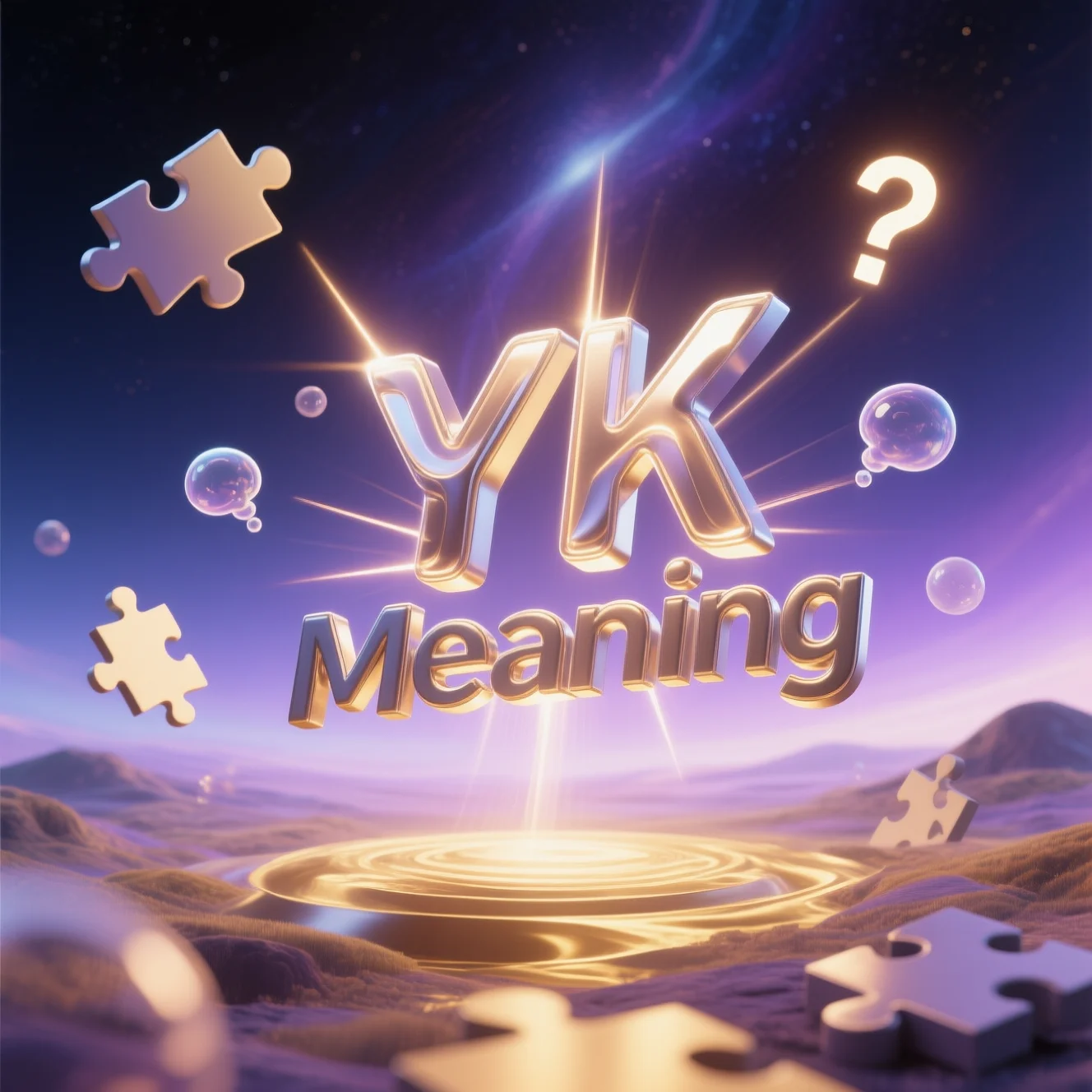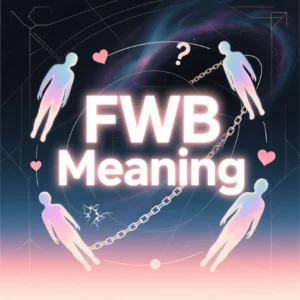In today’s fast-paced digital world, slang evolves quicker than you can type. One term you might’ve stumbled across is YK. It pops up in texts, social media, and even gaming chats. But what does it mean, and why should you care? YK is shorthand for “you know,” a phrase that’s become a staple in casual communication. Whether it’s a quick text to a friend or a witty X post, YK adds a laid-back vibe to conversations.
Understanding it helps you stay in the loop, avoid awkward missteps, and connect better online or offline. This blog dives into YK’s meaning, history, and usage across contexts, ensuring you’re ready to use it—or respond to it—like a pro. Let’s explore why this tiny acronym is a big deal in modern chats.
Definition & Meaning
YK stands for “you know.” It’s a shorthand way to acknowledge shared understanding or add emphasis in casual conversations. Think of it as a verbal nod, signaling that you and the other person are on the same page. It’s versatile, used to confirm, question, or even soften a statement.
Real-life examples:
- Texting: “I’m so done with this homework, YK?”
- Gaming: “That boss fight was brutal, YK.”
- Casual chat: “She’s always late, YK, it’s just her thing.”
In each case, YK assumes the listener gets the context without needing extra explanation. It’s like saying, “We’re in this together, right?” Its brevity makes it perfect for quick exchanges, especially in digital spaces where speed matters.
Background & History
The term YK comes from the phrase “you know,” which has been around forever in English. People have used “you know” as a filler or connector in speech for decades, especially in informal settings. With the rise of texting and social media in the early 2000s, abbreviations like YK emerged to save time and characters. Think of it as a cousin to LOL or BRB, born from the need to keep chats short and snappy.
By the 2010s, YK gained traction in online communities, especially among younger users on platforms like Twitter and Snapchat. Today, it’s common in texts, gaming lobbies, and even casual IRL talks. Its evolution reflects how digital culture prioritizes quick, punchy communication. While it started in English-speaking circles, YK has spread globally, thanks to the internet’s reach.
Usage in Various Contexts
YK shines in informal settings. Here’s how it’s used across different scenarios:
Texting:
- Friend 1: “I’m grabbing pizza later, YK?”
- Friend 2: “Yum, YK I’m in!”
It adds a casual, “we’re cool” vibe to quick messages.
Social Media:
- X Post: “This new song slaps, YK 🔥.” It’s a way to connect with followers, assuming they vibe with the sentiment.
Gaming:
- Player 1: “We’re gonna lose this round, YK.”
- Player 2: “Nah, YK we got this!”
It’s a quick way to rally teammates or vent frustration.
Casual Conversations:
- Person A: “That movie was wild, YK.”
- Person B: “Totally, YK it had me shook.”
Here, YK softens statements, making them feel collaborative.
Common Misconceptions & Clarifications
Some think YK is just lazy typing, but it’s more about efficiency and tone. It’s not a lack of effort—it’s a deliberate choice to keep things chill. Another misconception is that YK always expects agreement. Not true! It can also be a question, like, “You get me, right?”
In rare cases, YK might be misread as something else, like an initialism for a name (e.g., Yvonne King). Context is key to avoid confusion. Also, YK isn’t inherently offensive, but overuse in serious settings might seem flippant. For example:
- Boss: “We need this report by Friday.”
- Employee: “Got it, YK.” This could come off as too casual or dismissive.
Similar Terms & Alternatives
YK isn’t alone in the slang world. Here are related terms:
- YKWIM: “You know what I mean” – a longer version for clarity.
- TBH: “To be honest” – adds honesty, not assumption.
- RN: “Right now” – shifts focus to timing.
| Term | Meaning | Tone |
|---|---|---|
| YK | You know | Casual, collaborative |
| YKWIM | You know what I mean | Clarifying, friendly |
| TBH | To be honest | Honest, direct |
| RN | Right now | Urgent, timely |
These alternatives let you switch up your vibe depending on the chat.
How to Respond to This Term
Responding to YK depends on the mood you’re going for:
Casual:
- Friend: “This party’s gonna be lit, YK.”
- You: “Oh, YK I’m there!”
Funny:
- Friend: “I’m broke after shopping, YK.”
- You: “YK I’m eating instant noodles too!”
Professional:
- Colleague: “The client’s picky, YK.”
- You: “I understand, let’s address their concerns.”
Privacy-conscious:
- Stranger: “That game’s tough, YK.”
- You: “Yeah, it’s a challenge!”
Keep it short and match the vibe. If you’re unsure, a simple “Yeah” or “Got it” works.
Regional or Cultural Differences
YK is mostly an English-language term, rooted in American and British slang. It’s widely understood in English-speaking countries like the US, UK, Canada, and Australia. In non-English cultures, it’s less common unless people are active in global online spaces like gaming or X. For example, a Spanish speaker might use “sabes” (you know) instead, while French speakers might say “tu sais.”
In some regions, local slang overshadows YK. In Australian slang, “mate, you know” might feel more natural. Multicultural online communities, YK is universal enough to cross borders, but its usage spikes in youth-driven spaces like TikTok or Discord.
Comparison with Similar Terms
| Term | Usage Context | Key Difference |
|---|---|---|
| YK | Casual, assuming shared knowledge | Shortest, most versatile |
| YKWIM | Clarifying a point | More specific, asks for agreement |
| TBH | Adding honesty | Focuses on truth, not assumption |
| RN | Emphasizing timing | Time-specific, not about knowledge |
YK is the go-to for quick, casual chats, while YKWIM digs deeper into mutual understanding.
Usage in Online Communities & Dating Apps
On X, YK often appears in posts to create a relatable vibe:
- Post: “Mondays hit different, YK 😩.” It invites followers to nod along.
In gaming communities like Discord, YK is a staple:
- Player: “This lag is killing me, YK.” It’s a quick way to vent or bond.
On dating apps like Tinder, YK keeps things flirty and light:
- Match: “I’m into sci-fi movies, YK.”
- Reply: “Oh, YK I’m down for a Star Wars marathon.”
Tip: Respond with enthusiasm or a question to keep the chat flowing, like, “YK I love that too—what’s your fave?”
Hidden or Offensive Meanings
YK is generally safe, but context matters. In rare cases, it could be mistaken for something else, like initials or a typo. For example, in a heated argument, “YK” might sound dismissive if overused:
- Person A: “I’m upset, YK.”
- Person B: “YK, I don’t get why you’re mad.” This could escalate if the tone feels sarcastic.
There’s no widespread offensive meaning, but in formal or sensitive settings, it might seem too informal. Always gauge the room before tossing in a YK.
Suitability for Professional Communication
YK is rarely suited for professional settings. It’s too casual for emails or formal meetings, where clarity and respect matter. For example:
- Email: “The project’s delayed, YK.” This risks sounding unprofessional.
Alternatives:
- “As you’re aware”
- “I believe you understand”
- “For your information”
Use these to keep things polished. In casual workplace chats, YK might work, but only with colleagues you know well.
FAQs
- What does YK stand for?
It means “you know,” used to assume shared understanding or add a casual vibe. - Is YK only for texting?
No, it’s used in social media, gaming, and casual talks too. - Can YK be offensive?
Not usually, but it might seem dismissive in serious contexts. - How do I respond to YK?
Match the tone—say “Yeah,” “Got it,” or something playful like “YK I’m with you!” - Is YK used globally?
Mostly in English-speaking areas, but it’s spreading online. - What’s a formal alternative to YK?
Try “as you know” or “I understand.”
Conclusion
YK is a small but mighty piece of slang, meaning “you know” and packing a casual, collaborative punch. From texting to gaming, it’s a go-to for quick, relatable chats. While it’s not for formal settings, its versatility makes it a favorite in digital and IRL conversations. Understanding YK helps you navigate modern slang, avoid missteps, and connect effortlessly. So, next time someone drops a “YK,” you’ll know exactly how to keep the vibe going. Stay sharp, and YK, you’ve got this!



